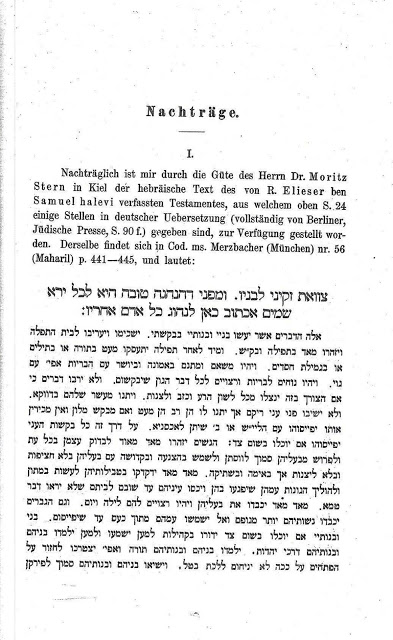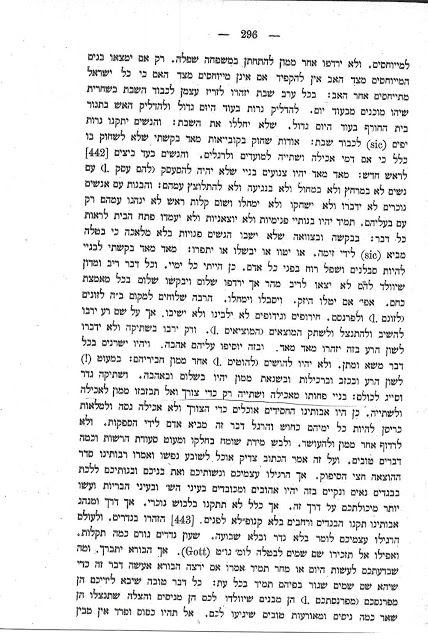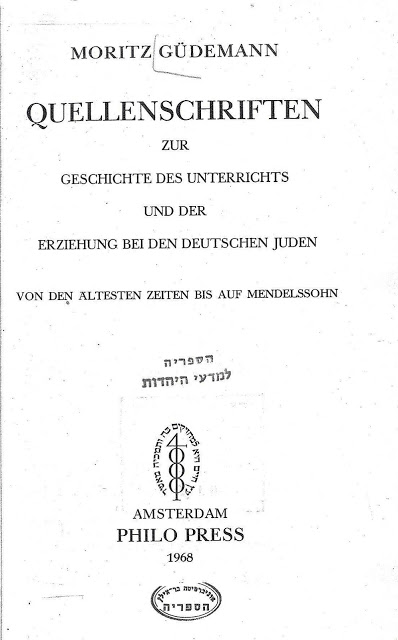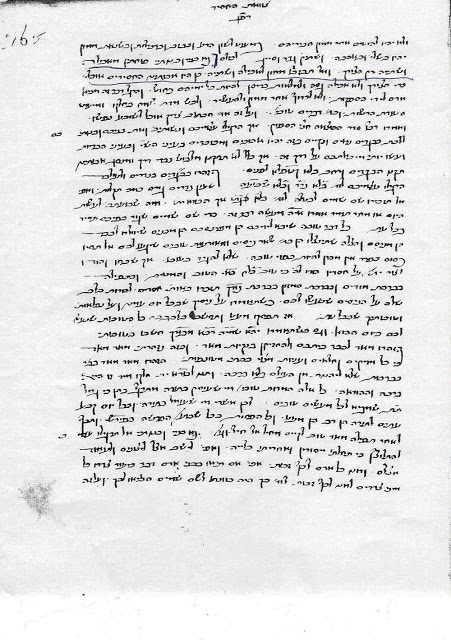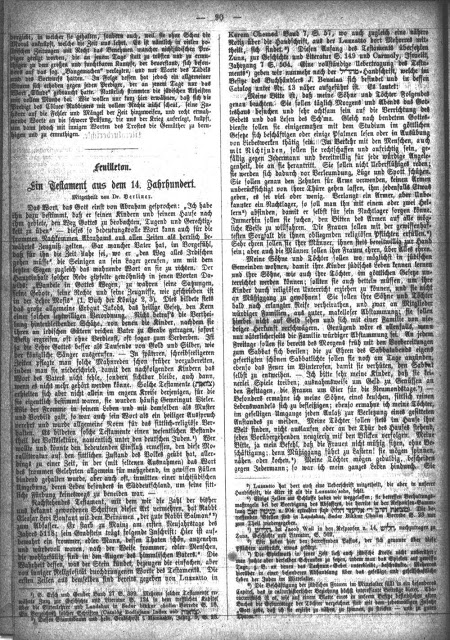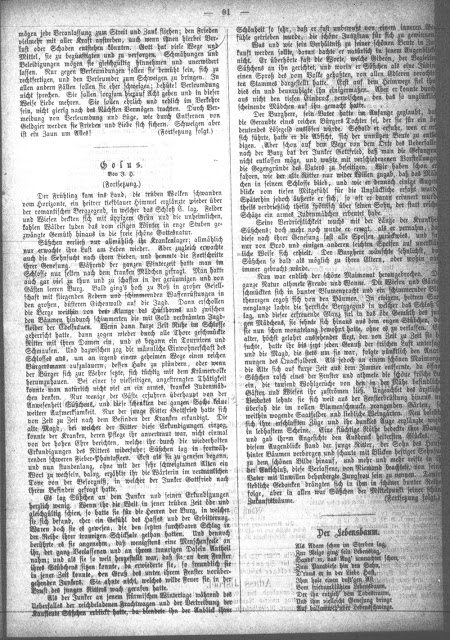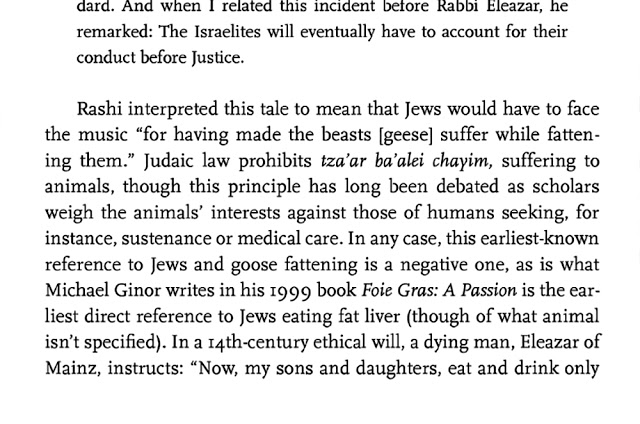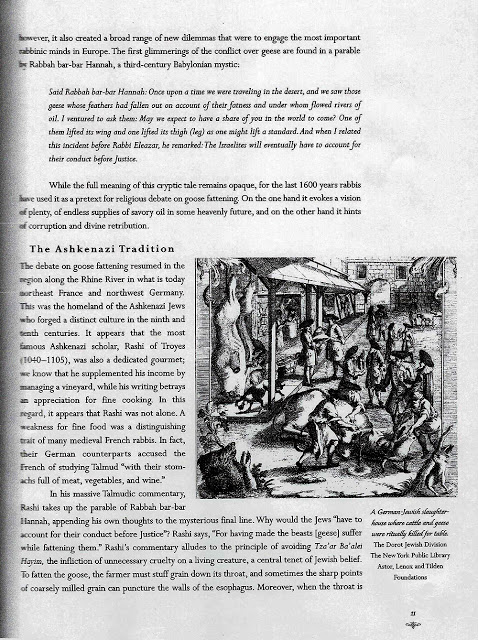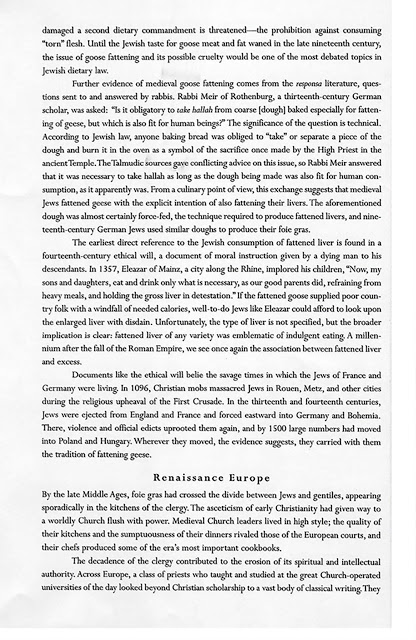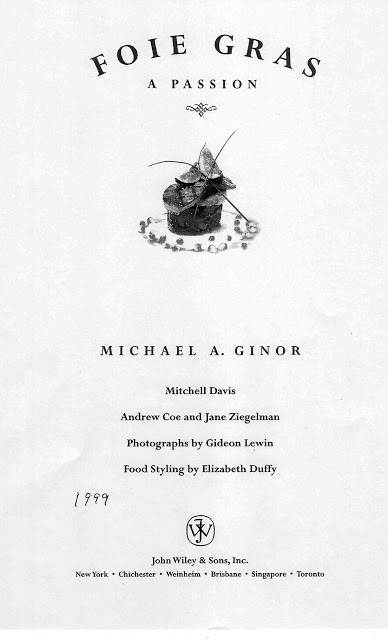Foie Gras “Fake News”: A Fictitious Rashi and a Strangely Translated Ethical Will
by Ari Z. Zivotofsky
Controversial topics can sometimes lead to contrived sources, i.e. fake news. That is certainly true with the effort by vegetarians to find traditional sources to support their position. In the past I have shown how a booklet claiming Judaism supports vegetarianism was full of misquotes (here
here ) and how a “quote” of the Rema was fabricated (
here ). Here I will expose two fake quotes that have been used by vegetarians in the battle against foie gras.
Foie gras (pronounced “fwä-grä, meaning “fat liver” in French) is the fattened liver of a waterfowl that grew to 5-10 times its usual size due to gavage. Foie gras, a delicacy today rightly associated with the French who are indeed by far the largest producers and consumers of it, was for much of history an Ashkenazi Jewish expertise. This luxury item has been the subject of a great deal of controversy in recent years. Until its production was banned in 2003 by the Supreme Court, Israel was one of the leading producers in the world. Within the last year, kosher foie gras has begun to be produced in the US for the first time in history.
The issue driving the current debate is animal welfare, or in the Jewish world, tza’ar ba’alei chaim. For hundreds of years, in traditional Jewish sources “stuffed goose” was indeed controversial, but not because of animal welfare. The debate revolved around potential treifot due to possible damage to the esophagus caused during the feeding process. it was a widespread debate involving the greatest of authorities. The Rema (YD 33:9) notes that in his town they would stuff geese to make schmaltz and they would check the veshet of each bird. Rav Yoel Sirkis (Bach, YD 33) was in favor of banning force feeding because of this potential serious problem. The Aruch Hashulchan (YD 33:37) says they did not do force feeding in his town. The Chochmas Adam (16:10) preferred to ban the gavage process because of the concern for treifot of the veshet, but agreed that if done, it could potentially be kosher. In modern times the Tzitz Eliezer (11:49, 11:55, 12:52) and Rav Ovadia Yosef (Yabia Omer 9:YD:3) came out against foie gras, while Rav Yosef Shalom Elyashiv was reported as approving the foie gras that was being produced in 2005. The most famous posek to permit stuffed geese was the Chasam Sofer (2:YD:25; Chullin 43b).
Despite the centuries long debate, force feeding geese was extremely common among Ashkenazic Jews. Many of the greatest poskim lived in regions where they would have been personally exposed to the process and yet none of them ever suggested that it was cruel and bordered on tza’ar baalei chaim. The issue was not even raised for discussion until the late 20th century. The only place tzaar ba’alei chaim is mentioned in the context of fattened geese is in the opposite direction – the rabbis were aware that geese used to being fed in this manner would not eat any other way and thus, out of concern for tza’ar ba’alei hayyim, permitted, with certain stipulations, gavage for these geese on Shabbat (Mishna Berurah 324:27). This is as opposed to other chickens and geese, for which this is not permitted.
Despite efforts by some to demonstrate that force feeding geese is cruel and was recognized as such by Jews in previous generations, it’s a common misunderstanding based on a mistranslation that seems to defy explanation, and one of these situations where people keep repeating an error because they didn’t examine the primary source. In contemporary Jewish anti-foie gras literature, two “quotes” are regularly bantered about, even by scholars. One is a “quote” from Rashi and the other from a 14th century ethical will.
Both quotes can be found in the book “The Foie Gras Wars: How a 5,000-Year-Old Delicacy Inspired the World’s Fiercest Food Fight” (2011) by Chicago Tribune reporter Mark Caro. On p. 26 he writes:
“Rashi interpreted the tale to mean that Jews would have to face the music ‘for having made the beasts[geese] suffer while fattening them’.”
And on p. 26-27 he writes:
“In a 14th-century ethical will, a dying man, Eleazar of Mainz, instructs: “‘Now, my sons and daughters, eat and drink only what is necessary, as our good parents did, refraining from heavy meals, and holding the gross liver in detestation’.”
The comment of Rashi sounds like it may indeed be a condemnation of fattening geese. It turns out that Rashi never wrote any such thing. First, the source for this “quote” is Bava Basra 73b and as is well known, on 29a of Bava Basra of our printed texts, there is a note in bold letters in the Rashi column that says: “until here is the commentary of Rashi zt”l, from here on in is the commentary of Rabbeinu Shmuel ben Rav Meir”, ie Rashbam. The first error is therefore that the comment was not written by Rashi but by his grandson.
Nonetheless, even if Rashbam had written that, it would be of significance. But he didn’t.
The comment was made on the 10th of the fantastic, esoteric tales of Rabbah bar bar Chanah. The story is:
תלמוד בבלי מסכת בבא בתרא דף עג עמוד ב
ואמר רבה בר בר חנה: זימנא חדא הוה קא אזלינן במדברא, וחזינן הנהו אווזי דשמטי גדפייהו משמנייהו וקא נגדי נחלי דמשחא מתותייהו, אמינא להו: אית לן בגוייכו חלקא לעלמא דאתי? חדא דלי גדפא, וחדא דלי אטמא. כי אתאי לקמיה דרבי אלעזר, אמר לי: עתידין ישראל ליתן עליהן את הדין.
Rabbah b. Bar Hana also related: We were once travelling in the desert and saw geese whose feathers fell out on account of their [excessive] fatness, and streams of oil [fat] flowed under them. I said to them: ‘Shall we have a share of your [flesh] in the world to come?’ One lifted up its wing, the other lifted up its leg. When I came before R. Elazar he said to me: Israel will be held accountable because of them.
Commenting on the last line, Rashbam commented:
רשב”ם מסכת בבא בתרא דף עג עמוד ב
ליתן עליהם את הדין – שבחטאתם מתעכב משיח ויש להם צער בעלי חיים לאותן אווזים מחמת שומנן.
According to the Rashbam, the Jews are responsible for the suffering of the geese in that the geese had to live extra-long with unnatural fat because the Jews sinned and thereby delayed the coming of the Messiah and the slaughtering of these geese. The Rashbam was discussing a fanciful story involving the suffering of mythical geese whose feathers fall out and whose fat drips off of them, i.e. who were clearly suffering and are different from a typical goose. Such geese he suggests may suffer due to their excessive fat. He makes no mention of the fattening process and says nothing about any suffering during that process or about the suffering of geese that his Jewish neighbors were raising.
And how about the ethical will? Hebrew Ethical Wills (JPS Library of Jewish Classics) (English and Hebrew Edition) [1976], Israel Abrahams (Editor), Judah Goldin (Foreword) is a facsimile edition of the 1926 original. Beginning on p. 207 is “The Ideals of an Average Jew (Testament of Eleazar of Mayence)” and on p. 212 it indeed says: “Now, my sons and daughter, eat and drink only what is necessary, as our good parents did, refraining from heavy meals, and holding the gross liver in detestation.”
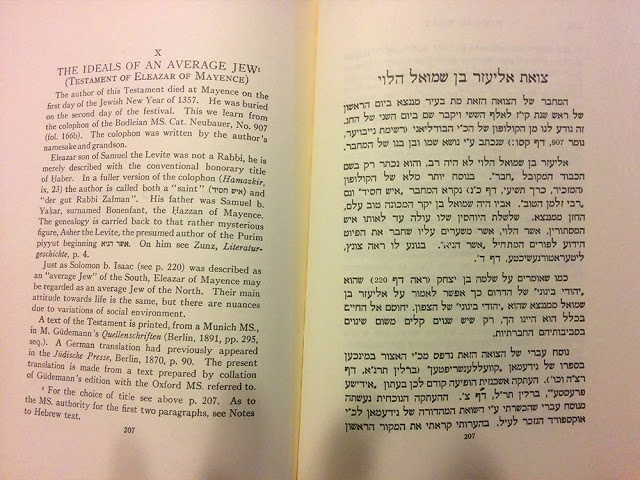
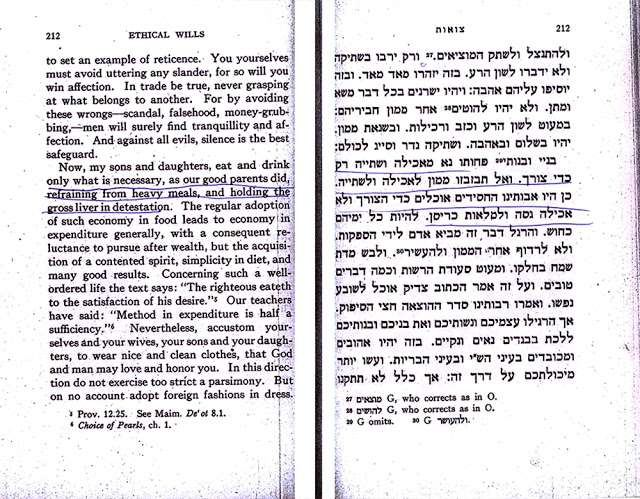
From this it is not at all clear why liver should be so disliked, and it is certainly not obvious that he is talking about foie gras. It could be that he simply abhors liver (perhaps because, as Chazal note, it is full of blood). In an effort to better understand, I looked on the other side of the page, at the Hebrew text. And what a shock! It seems that when Israel Abrahams (Reader in University of Cambridge and a Senior Tutor at Jews’ College) translated this text he used some poetic license, likely never suspecting it would be then adopted by the anti-foie gras activists. Here is what the Hebrew found in Abrahams says:
בניי ובנותי פחותו נא מאכילה ושתייה רק כדי צורך. ואל תבזבזו ממון לאכילה ולשתייה. כן היו אבותינו החסידים אוכלים כדי הצורך ולא אכילה גסה ולמלאות כריסן. להיות כל ימיהם כחוש.
No mention whatsoever of liver! It appears that it is not an actual translation. It seems strange that Abrahams fabricated the liver in the English. He says the translation was made on the basis of two Hebrew texts. Maybe he translated straight off of them and the Hebrew in his edition is not accurate. The first is a text that is based in a Munich MS and appears on Moritz Güdemann’s Quellenschriften (Berlin, 1891, reprinted by Philo Press in 1968).
There on p. 296 one finds an almost identical text:
בניי פחותו נא מאכילה ושתייה רק כדי צורך ואל תבזבזו ממון לאכילה ולשתייה. כן היו אבותינו החסידים אוכלים כדי הצורך ולא אכילה גסה ולמלאות כריסן להיות כל ימיהם כחוש
The other manuscript is Bodleian MS cat Neubauer No. 907, fols. 164a-166a (not 166b as Abrahams erroneously wrote) and the relevant section is at the top of 165a (I thank Ezra Chwat for his assistance in obtaining this ms.). As can be seen the text is identical to that found in the Abrahams’ book.
There seemed to be a final possibility. In his introduction, Abrahams notes that a previous translation, into German, had appeared in the journal Jüdische Presse, Berlin 1870, p. 90.
The journal is available
here (I thank Sharon Liberman Mintz for finding that link for me). In issue 11 (Sept 9, 1870) a translation appears on the 6th and 7th page of the issue, pages 90-91 of the volume, as can be seen in the figure below.
However, it is only a translation of the first half of the will, ending just before the relevant section. It says that it was to be continued, but unfortunately that was the first year of the journal and the next issue (12) is missing (as are several others such as 3, 7, 9, 10) from the digitized microfilm at that website and I have been unable to locate it in any Israeli library. the translation until that point seems to be accurate and it is hard to ascribe the insertion of the liver to the German translator (I thank Rabbi Dr. Seth Mandel and Prof Michael Segal for assistance with the German).
It thus seems clear the liver was inserted into the English transition for some inexplicable reason, but certainly does not appear in this 14th century ethical will.
Once an author is convinced of the authenticity of the sources they often embellish. In the academic work, Food and Morality: Proceedings of the Oxford Symposium on Food and Cookery (2007) edited by Susan R. Friedland, there is a chapter called the foie gras fracas: sumptuary Law as Animal welfare? By Cathy K. Kaufman, a scholar-chef and Adjunct Chef-Instructor, Institute of Culinary Education, in New York City.
On p. 126 she writes:
“The best written evidence for the medieval production of foie gras – and its ambiguous moral status – is found among the writings of the Ashkenazi Jews who spread throughout Europe. Rabbi (sic) Rashi ……”
But in fact we have shown that among the Jewish writings there is ZERO evidence regarding any ambiguous moral status!
Even the well-known American cookbook author Joan Nathan couldn’t avoid this pitfall.
Recently, in her King Solomon’s Table: A Culinary Exploration of Jewish Cooking from Around the World (2017) on p. XXI she wrote:
“Rashi was a thinker who knew both religion and agriculture. He condemned, for example, the force-feeding of geese to produce foie gras ….”.
In 2013, an article in Moment magazine (
here) stated:
“More complex, however, were the ethical questions. In the 11th century, the French scholar Rashi warned Jews against the force-feeding practice, “for having made these beasts (geese) suffer while fattening them.” This went against Jewish law prohibiting tza’ar ba’alei chayim, suffering to animals, although some rabbis claimed that since none of the geese’s limbs were harmed and the geese did not feel discomfort in their throats, foie gras was not treyf, or forbidden. Other rabbinic scholars suggested that it is only permissible to inflict pain on an animal when the benefit of doing so is significant; since there are no real nutritional benefits to foie gras, the process of force-feeding was questionable.”
One can only wonder who these “some rabbis” and “other rabbinic scholars” were who argued with this non-existent Rashi!
The book that is the source for many of these other articles is the beautiful coffee-table book Foie Gras: A Passion (1999) by Michael Ginor and Mitchell Davis. Ginor, an American who spent two years in the IDF and while in Israel discovered foie gras, co-founded, co-owns, and is President of NY based Hudson Valley Foie Gras and New York State Foie Gras, the most comprehensive foie gras producer in the world. His book is an absolutely comprehensive book on everything one could possibly want to know about foie gras. And there on p. 11 he quotes the non-existent Rashi and on p. 12 the English version of the strangely translated ethical will. I have no idea where he found those two quotes that have today become so common in the vegetarian literature.
The fact that all one has to do is look in the Hebrew originals to see that these quotes are fake news, explains why they are found in English sources and I have not yet found them in any of the Hebrew works on animal rights.


